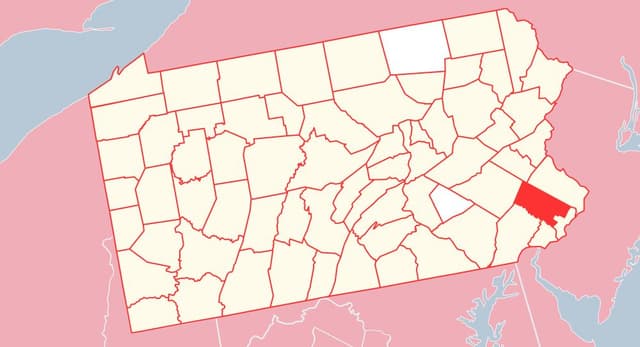
Rehabs in Montgomery
Montgomery County (Montco) is the 3rd most populous region in the Commonwealth of Pennsylvania. The administrative center is in Norristown. The latter is also the largest city in the county. According to the 2020 US Census, the population was 856,553.
This region is geographically diverse. That is to say, you are to find farms and open land in the north of the county. On the other hand, in the southern and central parts, there are densely populated suburban neighborhoods. It is a wealthy region and home to a prosperous economy.
However, this area is also facing harmful and deadly consequences of substance abuse. Heroin, opioids, cocaine, alcohol, and prescription pills are being widely used among residents. The increase in drug-involved death rates is to be underlined. In 2002, there were only 39 drug-involved fatalities. On the contrary, in 2015, this rate increased by 351% (177 drug-related deaths during a year).
In brief, misuse of heavy substances became a serious problem in this area. Take action, if you have admitted that you have a dependency. Many reputable drug and alcohol rehabs in Montgomery County, PA are here to offer you quick and quality treatment.
Available Treatment Options
People with various types of addictions may find support at drug and alcohol rehabs in Montgomery County, PA. Apply for the help of these hubs as soon as possible. The centers offer various treatment options that will suit your individual needs. Through an assessment, a licensed counselor will create an individual plan that will bring quick results. Moreover, you are to choose either inpatient or outpatient therapy, pass detox, and receive aftercare support.
Detox
To obtain sobriety on your own is not an easy task. Sometimes it is not only a dangerous procedure but also may result in relapse later on. To safely remove the toxins from the body, apply for proper aid at the detox center. The latter has a monitored environment, where you will receive medical and emotional support. Moreover, you will overcome painful withdrawal symptoms without damaging your health.
Inpatient
Find the best treatment for severe addictions at the inpatient/residential rehab. The latter offers around-the-clock control and medical support. The patient has to live at the hub until the end of the therapy. As the recovery is a long-lasting process, the person may stay at the hub from a month to a year or more. Several factors impact the length. It is the severity of the addiction, the existence of co-occurring mental health disorders, type of dependency, etc. This type of care is the most effective one.
Outpatient
This therapy has three main levels: intensive outpatient program (IOP), outpatient therapy, and partial hospitalization program (PHP). IOP is suitable for those that need intensive care but can’t stay at the facility. They are customized and different in length and intensity. However, they include all the components of inpatient care. Generally, outpatient care plans contain detox, management, and counseling. They are for those who have already completed inpatient treatment. They usually include medication-assisted treatment and group and individual courses.
PHP
PHP is a short-term intensive rehab with a structured program. Generally, the patients visit the hub 3-5 times a week and spend around six hours there. It may last from 1 to 6 months.
Aftercare
Aftercare provides support and other resources on a continued basis. It offers sober homes, 12-step meeting groups, ongoing medical control, and counseling. Meeting with peers and people who have already battled dependency, helps to live a drug-free life and reach a life-long recovery.
Payment
The cost of the rehab depends on different factors. Sometimes addicts don’t get proper help because of limited financial abilities. However, many rehabs in Montgomery, PA accept private health insurance plans. There are also state-funded ones that accept Medicaid, Medicare, and Military insurance. Moreover, you are also to find other financial aid, like grants, scholarships, and sliding fee scales.
